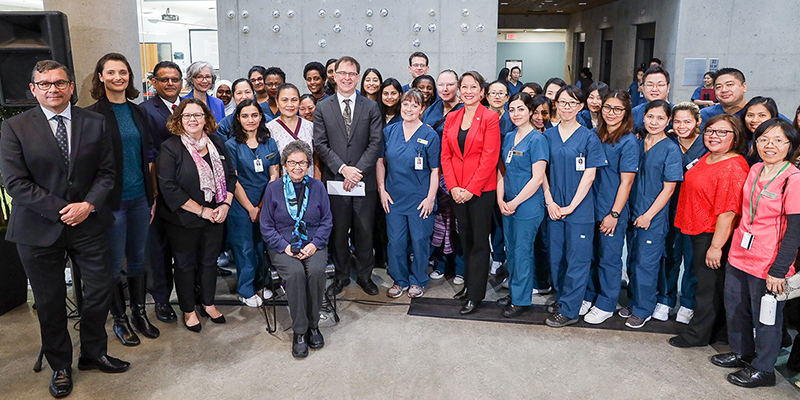Archive 2013-2019
VCC receives support to increase number of trained caregivers

The B.C. Ministry of Health and the Ministry of Advanced Education, Skills and Training are providing approximately $3.64 million over the next two years to create 418 new health care assistant seats in 14 post-secondary institutions throughout British Columbia. Health care assistants are also known as care aides, community health workers, and other titles.
"In long-term care, in the community and in acute care, we need more health care assistants. Ask anyone in need of care and you will hear stories of the value of the work of care aides and community health workers," said Adrian Dix, Minister of Health. "This investment to train more health care assistants will help us meet our government's goal of improving care standards and expanding options for seniors. It will help people get trained for some of the most important and in-demand jobs in our province, making sure British Columbians get the quality care they need and deserve. Four hundred and eighteen new seats in 14 post-secondary institutions will make a big difference."
There are currently an estimated 25,500 health care assistants employed by health authorities and affiliated employers in British Columbia. Health care assistants provide personal support services for people living with disabilities and those living with acute or chronic illnesses, including seniors. They work in a variety of settings, including long-term care homes, acute care, home support, and assisted living.
"Expanding the number of health care assistant seats throughout the province brings education and health care close to home. Our government is committed to ensuring people receive the quality care they need when they need it most," said Melanie Mark, Minister of Advanced Education, Skills and Training. "Health care assistants play an important role in B.C.'s healthcare system, and by expanding the number of seats in all regions of the province, we will ensure that people continue to benefit from their care."
There are 17 publicly funded post-secondary institutions throughout B.C. that offer health care assistant training. Training programs are approximately six to 10 months long. The first of the new seats became available to post-secondary institutions in September 2019.
The ministries of Health and Advanced Education will provide $200,000 in funding to VCC to add 12 additional health care assistant seats to its program.
"Health care assistants are making a real difference for the people they care for," said Anne Kang, Parliamentary Secretary for Seniors and Multiculturalism. "By providing more training spaces for people wishing to become a health care assistant, we are taking an important step to ensure that caregivers are there for the British Columbians who need them."
Increasing the number of trained health care assistants in to B.C. is part of government's commitment to strengthen the supports available to seniors. Government is investing approximately $1 billion over three years to improve care for seniors, including investments in primary care, home health, long-term care and assisted living. This also includes $240 million over three years to increase staffing levels in long-term care homes, with the goal of achieving 3.36 direct care hours per resident day – on average – across all health authorities by the end of 2020-21.
The Province has proclaimed Friday, Oct. 18, 2019, as Health Care Assistant Day.
Quick Facts:
- In 2019, 19 per cent of B.C.'s population is 65 or over. In 15 years, this percentage is expected to rise to 25 per cent.
- In 2018, the B.C. Governemnt provided approximately $3.3 million to create 384 health care assistant seats in 11 post-secondary institutions in B.C.
________________________________________
Learn how VCC's health care assistant program can get you working in as few as seven months.
